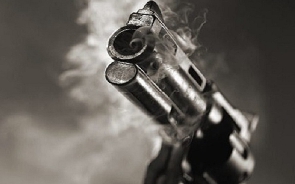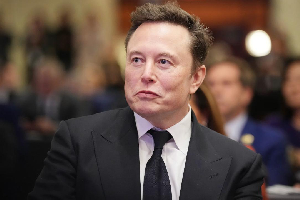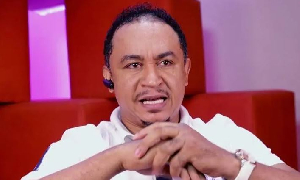By Kwame Okoampa-Ahoofe, Jr., Ph.D.
That the personality profile of President Nkrumah seems to have preoccupied many of the global leaders who dealt with him, is a subject that ought to pique the interest and attention of future students and scholars of Ghana’s first postcolonial premier. There was one prominent African leader, for instance, who absolutely had no reservations, or doubts in his mind, whatsoever, that Nkrumah had dire need of a psychiatrist, according to Mahoney. And that African leader, a philosopher-poet and a giant of African letters, was none other than Senegal’s President Léopold Sédar Senghor. Asked by a genuinely confused and palpably frustrated President Kennedy what he thought about his Ghanaian counterpart, Mahoney tells readers that Mr. Senghor simply stated that “What Nkrumah needed more than anything else was a psychiatrist” (JFK: Ordeal in Africa 176).
Implicitly and ironically, however, Mahoney tells his readers that in the absence of any progressive leadership alternative on the African continent, Nkrumah deserved to be tolerated by way of a stop gap or transitional fortitude. In other words, what Mr. Senghor meant by the foregoing was that Ghana’s proverbial Show Boy was that necessary evil of “a mad genius.” The Senegalese leader would further cast matters more tersely and poignantly in his French official tongue: “Et un trés bon psychiatrique.” I have personally wondered in recent years, whether it is not well nigh time that a Department of Nkrumah Personality Studies was established at all the major higher educational institutions on the African continent and, perhaps, even beyond.
Interestingly, while Nkrumah’s evidently volatile temperament, pretty much in synch with the temper of the times (apologies to the Bard-of-Avon), had not remarkably endeared him to the West, much of which global political sphere envisaged the Show Boy as a dyed-in-the-wool communist, nonetheless, his fiery ambition to personally supervise the industrial development of Ghana and, indeed, continental Africa at large, does not appear to have failed in igniting the admiration of America’s first Irish-descended president. Caught between backing and summary withdrawal from the Volta project, otherwise known as the construction of the Akosombo Dam, Mahoney vividly recalls Mr. Kennedy making the following remark: “We have put quite a few chips on a very dark horse[,] but I believe the gamble is worthwhile” (JFK: Ordeal in Africa 179).
In other words, while he may ordinarily not have bothered investing any modicum of confidence in this pet project of the ideologically erratic and temperamentally unpredictable Ghanaian leader, nevertheless, Nkrumah was not altogether unworthy of such blind trust. And so yes, in the cognitively well-calibrated opinion of President Kennedy, the flamboyant Ghanaian leader was worth an iota of the proverbial benefit of the doubt.
One major problem that appeared to peevishly confront the postcolonial African leader throughout most of the 1960s, was the perennial and peculiar white-American hang-up of the “Dumb Nigger” stereotype, a pathological carryover from the historical enslavement of the Diaspora African and its vestigial concomitant of undifferentiated disdain for the proverbial African personality. Thus in June 1962, when President Nkrumah convened a nuclear disarmament conference in Accra themed “World Without The Bomb Conference,” the knee-jerk reaction of the Kennedy administration was to cynically claim that the entire conception and hosting of the confabulation had been hatched in Moscow. This is how the author of JFK: Ordeal in Africa cast it: “The majority of the 100 delegates attending the conference were from the East and, as far as the [Kennedy] State Department was concerned, this meant that it was ‘Soviet Sponsored.’ Ambassador Mahoney disagreed, and set about to organize the Western delegates, chiefly, Sean McBride of Ireland [founder of Amnesty International?], Lord Kennett of Great Britain, and James Wadsworth of the United States. As a result of the embassy’s efforts, the resolutions finally adopted by the conference [conferees?] proved to be considerably less obnoxious than expected” (180).
Mahoney offers, perhaps, the most poignant appreciation, to-date, of what Dr. Danquah characterized as “the ticking time-bomb of Trans-Volta Togoland.” The reference, of course, was to the UN-sponsored 1956 plebiscite, or referendum, that precipitated the incorporation of the British-ruled half of present-day Togo as a part of independent Ghana. Danquah had, hitherto, strongly argued on linguistic and cultural grounds that the present-day Volta Region, or at least the Ewe-speaking parts of it, ought to have been organically unified with its Francophone half. Indeed, it was primarily for this convicted stance of the Doyen of Gold Coast and Ghanaian politics that Danquah routinely trounced Nkrumah at polls organized in the newly created Volta Region.
In return for ceding the Volta Region to the French, Danquah had argued, unsuccessfully, for the Akan-speaking areas of the Ivory Coast to be organically incorporated into the newly created Republic of Ghana. On both stances, Nkrumah had vehemently and successfully opposed Danquah. Subsequent political developments have, of course, proven Danquah to have been the wiser for his positions. On the foregoing score, this is what Mahoney has to say: “Ghana’s neighbor to the east, Togo, had long been a meeting and staging ground for Ghanaian opponents of the Nkrumah regime. The feud between Ghana and Togo had begun in 1956 when a UN plebiscite had permanently split the Ewe tribe in two by giving Ghana sovereign control over British-administered Togoland. The French Togolese [sic] believed that the election had been rigged and blamed Nkrumah for having forced the UN’s hand. From that point forward, Togo [had] served as a dissident and, at times, terrorist sanctuary for Nkrumah’s adversaries” (181).
In essence, in the pan-Africanist imagination of the Ghanaian leader, the need to preserving the ethnic and cultural organicity of people of Ewe descent decidedly played second-fiddle to the imperative need for the immediate geopolitical unification of the African continent, even as Nkrumah had himself suggested in his speech officially declaring Ghana to be a sovereign nation, as follows: “The independence of Ghana is meaningless unless it is linked up with the total liberation of the African continent.” As to whether such agenda had practical relevance for the Africa of 1957 remains moot. At any rate, Mahoney recounts the fact that an “October 1961 conspiracy to assassinate Nkrumah had [been forensically proven to have] originated in the Togolese capital of Lomé,” obviously as a payback by Olympio for Nkrumah’s adamant and “pharaonic” refusal to let Mr. Olympio’s “people go.”
Mahoney further recalls that “Ghana retaliated six weeks later by sending Togolese commandos, trained and armed in Ghana, across the border to assassinate President Sylvanus Olympio. The commandos nearly succeeded in their operation. The CIA and the State Department agreed that Nkrumah at least had prior knowledge of the operation and probably planned it through his Bureau of African Affairs. The establishment of a commando training base for 400 exiled Togolese at Wora Wora, in the Volta Region, was further proof that the Ghanaians were deadly serious about ridding themselves of the Olympio regime” (181).
Nkrumah would have his avid and perennial wish some fourteen months later, on January 13, 1963, when “President Olympion was murdered by a group of Togolese soldiers. All eyes turned accusingly to Accra. Even Nkrumah’s ‘frère de combat’ [brother-in-arms] Sékou Touré demanded an international investigation of the murder (Mahoney 186).
To be fair to the Show Boy, it bears pointing out that Mahoney categorically observes that, indeed, President Olympio had collaborated with the U.S. Central Intelligence Agency to subvert Nkrumah’s government (JFK: Ordeal in Africa 182). But the author is also quick to point out that like the CIA, Nkrumah’s so-called Bureau of African Affairs was primarily and squarely established for the purpose of destabilizing African governments, as well as eliminating individual African leaders with whom Nkrumah was ideologically at cross-purposes. In sum, opines Mahoney, Nkrumah was no proverbial altar boy innocently about the godly business of seeing to the welfare of each and every Ghanaian citizen: “The Bureau of African Affairs [headed by the Afro-Caribbean Mr. George Padmore (aka Malcolm Nurse)?] also provided ideological and, to a lesser extent, paramilitary training for several hundred ‘freedom fighters’ from all over the continent. Ghana’s neighbors were frightened by the bureau’s sponsorship of dissidents from their own countries and were nettled by Ghana’s transmission of broadcasts throughout West Africa. The breadth of Nkrumah’s ambition was evident in his remarks at the opening of the Kwame Nkrumah Institute of Ideology at Winneba: ‘I see before my mind’s eye a great monolithic party growing up, united and strong, spreading its protective wings over the whole of Africa – from Algiers in the North to Capetown [sic] in the South, from Cape Guardafui in the East to Dakar in the West” (182).
Indeed, it is rather fascinating that the Ghanaian leader, who had firmly in place an elaborate subversive scheme and agenda to rid the continent of leaders whom Nkrumah considered to be insufferably pro-Western, such as Togo’s President Olympio, should vehemently decry imperialist designs to liquidate him. Regarding the 1962 Kulungugu assassination attempt on his life, Mahoney poignantly observes: “The circumstances of the attack suggested an inside job by a handful of Nkrumah’s more ambitious subordinates. Even after the arrest of two cabinet ministers [i.e. Ako-Adjei and Adamafio] and the party secretary [Coffie-Crabbe], however, the terrorist bombings continued. By late September 1962, the toll of dead and wounded exceeded 300. There was little doubt that Lomé was serving as the base of terrorist operations and, at least in Nkrumah’s mind, the reports of meetings between American officials and Gbedemah and Busia revived a fearful specter. In early October, at a meeting in Flagstaff House, Nkrumah, in a desperate tone, reported to aides that the ‘imperialists’ were trying to kill him (183).
It is quite difficult to pin down the critical role that a two-timing Mr. Komla Agbeli Gbedemah played in the turbulent period between 1961 and 1962, when Nkrumah and his CPP regime appeared to have been under the most intense stress. One thing, though, is quite certain: no levelheaded observer could plausibly accuse the Ghanaian opposition of having prejudiced President Nkrumah’s sometime staunchest and most dynamic lieutenant against the Show Boy. At the very least, Gbedemah was as vaultingly ambitious as Nkrumah, to begin with; and at the worst, his mercenary instincts, as a hitherto quite successful businessman, necessitated the fact that “Afro-Gbede” would be perpetually scheming to replace his former mentor at the least available opportunity. Regarding his self-serving shenanigans, this is what Mahoney has to report: “The CIA, in its fashion, had difficulty in leaving well enough alone. ‘The United Party of Ghana,’ one CIA cable from Accra wishfully pronounced, ‘is organizationally and mentally prepared to assume the reins of government in Ghana[,] should a turn of events make this possible.’ Agents in London and Lomé continued to consort with the exiled Gbedemah, who told them what they wanted to hear: that Nkrumah had murdered several of his ministers (this was simply erroneous) and was on the brink of ‘popular collapse.’ The State Department was ultimately obliged to instruct the embassy in Lomé to pass the word that contacts with Gbedemah and the rest remain covert. For this marginal vindication of common sense, officials at Langley [the CIA headquarters] scorned their counterparts at Foggy Bottom [i.e. the State Department] as ‘pro-Nkrumah’”(184).
*Kwame Okoampa-Ahoofe, Jr., Ph.D., is Associate Professor of English, Journalism and Creative Writing at Nassau Commmunity College of the State University of New York, Garden City. He is Director of The Sintim-Aboagye Center for Politics and Culture and author of “Sounds of Sirens: Essays in African Politics and Culture” (iUniverse.com, 2004). E-mail: okoampaahoofe@optimum.net.
###
Opinions of Friday, 20 January 2012
Columnist: Okoampa-Ahoofe, Kwame
Richard Mahoney: On Danquah And Nkrumah – Part Five
Opinions













